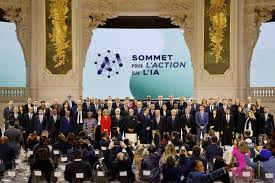AI will reshape France’s relations with the Middle East

Paris: The relationship between France and the Middle East has seen centuries of trade, political ties and cultural exchanges. Even in the postcolonial era, France remains closely linked to the region, as economic and political developments on one side inevitably impact the other. In recent years, this relationship has primarily comprised trade and investment, counterterrorism, energy partnerships and migration.
This historic relationship is now turning a new page. In line with the global enthusiasm for artificial intelligence and its transformative role in economic advancement, France is ramping up cooperation with its Middle East and North Africa partners in the field of AI, a priority area of French government policy.
This month alone, France has hosted the AI Action Summit, launched the third phase of its National AI Strategy and established the National Institute for the Evaluation and Security of Artificial Intelligence. While the strategy, part of France 2030, aims to strengthen France’s economic and technological sovereignty, leverage AI for social good and develop high-performance computing clusters, the institute will promote scientific research on AI, particularly its security implications.
The AI Action Summit hosted by the French government last week made it clear that France is on the hunt for international partners as it advances in this field. The most notable outcome was an investment of up to €50 billion ($52 billion) by the UAE toward the creation of a 1-gigawatt AI data center in France. This campus will be the largest in Europe dedicated to AI. It can significantly enhance the ongoing efforts made by the French private and public sectors for the adoption of AI through entrepreneurship and education.
Meanwhile, Morocco this month became one of eight international partners to join France in the launch of the Current AI public-private initiative that aims to raise $2.5 billion over the next five years to promote innovation in AI and assess its social and environmental impact. This is in line with a declaration of intent signed last October to establish a Franco-Moroccan Research Centre for the study of AI, big data and cybersecurity. It was signed during a visit to Morocco by French President Emmanuel Macron, which was heralded as the start of a new era of diplomatic relations between the two countries. It is clear that AI will be a key area of cooperation.
These developments build on existing French cooperation with the region. France and Qatar have agreed to jointly explore the potential to enhance their naval capabilities through AI technologies and unmanned systems. France and Turkiye are cooperating on research on AI and emerging technologies through the Bosphorus Programme, which is jointly run by French institutions and Turkiye’s Scientific and Technological Research Council. The French private sector is also a key player in French cooperation with the region. For instance, Mistral AI has attracted investments from the Saudi Public Investment Fund’s Sanabil and the UAE’s DAMAC Group.
However, despite such strong investments and partnerships, France faces the challenges of talent acquisition, competition from global AI powerhouses and regulatory constraints. To emerge as a leader in AI, France must continue fostering public-private and international partnerships, attract top talent and promote ethical and sustainable uses of the technology.
This is where partnering with the MENA region may offer a solution. The UAE’s proposed investment of up to €50 billion is critical for the flailing French economy, which requires support to generate employment, build infrastructure and regain the confidence of international investors. Investments in AI will also benefit other key sectors of the state, including defense, healthcare and education, while promoting French entrepreneurship in this field.
The latest agreements also point toward a critical juncture in French-Middle East relations. France and its European partners have historically invested their economic resources and technical expertise in the region to build manufacturing and energy industries. Today, the Middle East is in a position to support France financially and through intellectual partnerships.
The UAE has been notably successful in building its domestic AI capabilities — robust local large language models, dedicated funds for investment in AI and the world’s first minister of AI are some indicators of this success. International attention has rightly turned toward the Gulf state, and indeed the broader region, due to its role in the growth of AI through financing and as a geostrategic location for hosting AI infrastructure.
This shift in position highlights the mutual dependence of France and its partners in the Middle East. Cooperation between the two sides is crucial for the economic and technological future of both, especially in the fields of climate action, smart cities, trade, education and counterterrorism. By working toward the sustainable adoption of AI in key industries, France and its partners in the region are well placed to emerge as global leaders in AI, while adding a new layer and nuance to their bilateral cooperation.
On a broader level, the latest investments and the launch of Current AI confirm that the Global South is integral to Europe’s AI journey.





